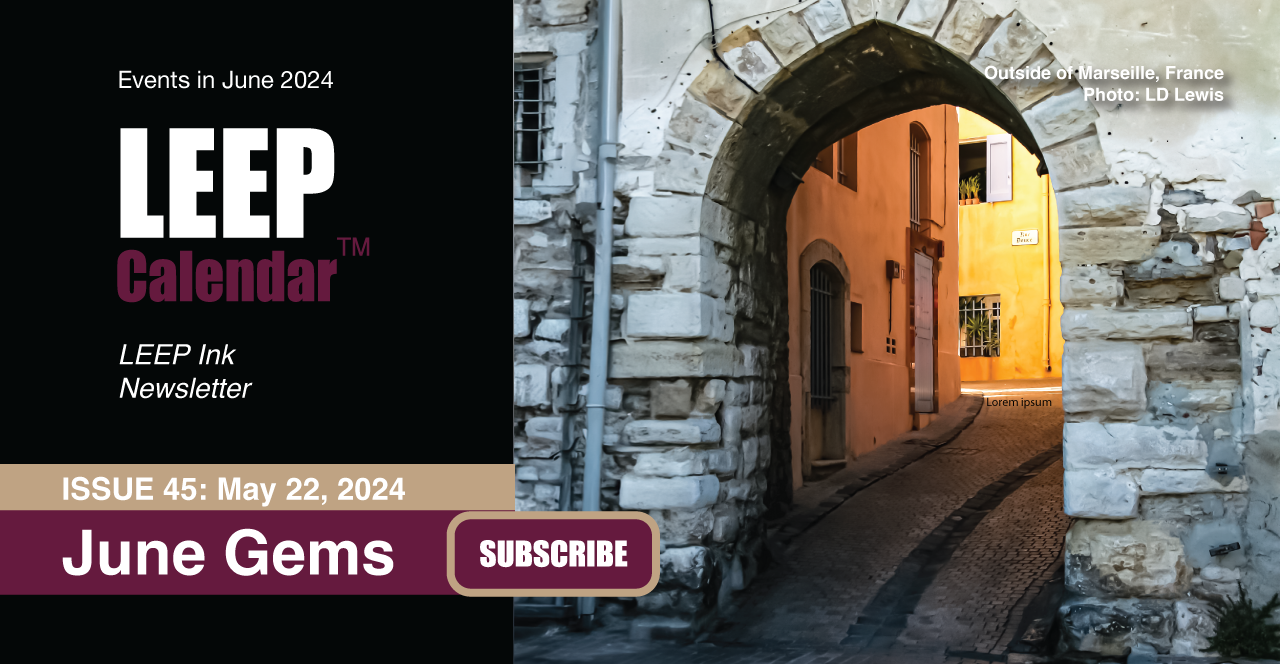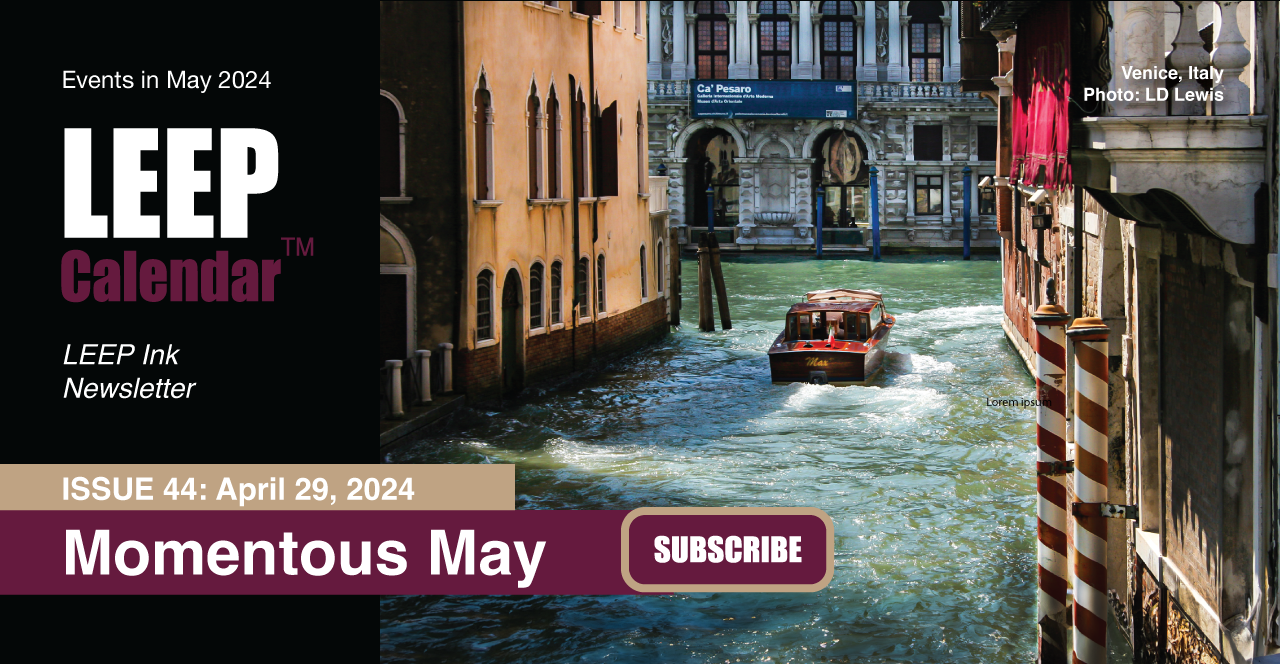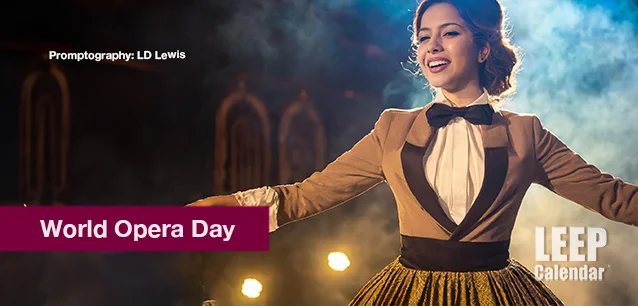The PROFESSIONAL Event, Editorial and Promotional Calendar
Today is: July 02
Scroll to explore events active on this date.
Additional Events on LEEP
LEEP INK FEATURES

July is a Jubilee of Events
This sign in a store window in Dublin gave me a good laugh! At 18, we're all geniuses. By 30, we realize we're idiots! Photo LD Lewis July is a Jamboree of Events! Happy July. Like every month, I pick...

June 2024 Gems
June's Gems Welcome to June. School is out, fun is in, and business tends to slow down for the next three months. Another June theme is children and keeping them engaged, learning and growi...

Momentous May Events
Prom, graduation, mothers, boating and barbeques are several themes in May. Along with October, May tends to be one of the most densely packed event months of the year. It's before the summer humidity and t...
About World Opera Day
Entertainment , Hobby
Career
Ends: Oct 25, 2025
DESCRIPTION:
World Opera Day, a relatively recent addition to the global calendar of cultural celebrations, is a significant event dedicated to promoting and appreciating the art of opera. It reflects a concerted effort by the international opera community to highlight the importance and relevance of this art form in today's world.WORLD OPERA DAY'S ORIGIN
World Opera Day launched in 2019. The date, October 25, was chosen for its significance in the history of opera; it is the birthdate of two great composers, Georges Bizet (October 25, 1838 - June 3, 1875) and Johann Strauss II (October 25, 1825 -June 3, 1899). Led by Opera America and Opera Europa, additional champions, including Ópera Latinoamérica and the International Artist Managers' Association, support and promote the event.WORLD OPERA DAY'S PURPOSE
The primary purpose of World Opera Day is to celebrate the art of opera and its contribution to cultural life around the globe. The day seeks to showcase the diversity and adaptability of opera, demonstrating its relevance across different cultures and societies.
A key objective is to emphasize the value of opera, not just as an entertainment form but as a means of cultural exchange, education, and social development. Activities promote a deeper understanding of opera, encouraging people, especially younger generations, to explore and appreciate this art form by demonstrating how opera seamlessly blends music, drama, and visual spectacle.ORIGIN OF OPERA
The birth of opera is generally traced back to Italy during the Renaissance period, around the late 16th century. It emerged as part of a broader artistic movement seeking to revive the theatrical styles of ancient Greece. "Dafne," composed by Jacopo Peri in the late 1590s, though it is Claudio Monteverdi's "L'Orfeo" (1607) that is considered the first great operatic work.
Opera quickly gained popularity in Italy and then spread to the rest of Europe. Each country adapted the form to its cultural context, leading to distinct national styles. For instance, French opera developed a more dance-oriented style under the influence of Jean-Baptiste Lully. In contrast, German opera, epitomized by the works of Richard Wagner, focused on integrating music and drama.
The 17th and 18th centuries are often considered the "golden age" of opera, with the emergence of figures like George Frideric Handel, Wolfgang Amadeus Mozart, and Giuseppe Verdi. Their works are still some of the most performed in opera houses worldwide.OPERA'S IMPACT ON MUSIC AND CULTURE
Opera revolutionized music by introducing the concept of the orchestra and by developing vocal techniques that showcased the human voice's expressive capabilities. It also pioneered the use of music to enhance narrative and emotional expression.
The genre has profoundly influenced broader cultural and artistic practices, including literature, theater, and visual arts. Opera's emphasis on combining various art forms paved the way for modern multimedia and cinematic experiences.OPERA'S EVOLUTION
In the 19th and 20th centuries, opera continued to evolve. Richard Wagner's concept of the "Gesamtkunstwerk" or "total work of art" sought to synthesize all the arts. In contrast, Italian composers like Giacomo Puccini developed verismo opera, focusing on everyday life and emotional realism.
Contemporary opera often pushes boundaries, incorporating modern themes, technologies, and musical styles. This continuous innovation ensures that opera remains relevant and engaging for today's audiences.
Originating in Renaissance Italy, opera has played a transformative role in the history of music and the arts. Its evolution from courtly entertainment to a global phenomenon encapsulates a journey of artistic innovation and cultural exchange. Opera's legacy lies in its stunning musical compositions and dramatic narratives and its enduring ability to connect deeply with human emotions and experiences across diverse cultures and eras.FIVE FAMOUS AND INFLUENTIAL OPERAS
"L'Orfeo" by Claudio Monteverdi
Premiere Date: February 24, 1607
Composer: Claudio Monteverdi
Often considered the earliest opera still regularly performed, "L'Orfeo" is a landmark in the history of opera, blending Monteverdi's dramatic musical composition with a mythological narrative.
"The Marriage of Figaro" ("Le Nozze di Figaro") by Wolfgang Amadeus Mozart
Premiere Date: May 1, 1786
Composer: Wolfgang Amadeus Mozart
"The Marriage of Figaro" is a cornerstone of the standard operatic repertoire and is noted for its intricate plot and brilliant use of melody.
"Carmen" by Georges Bizet
Premiere Date: March 3, 1875
Composer: Georges Bizet
"Carmen" is celebrated for its vibrant music and dramatic story. Although the opera initially received mixed reviews, it has become one of the most popular and frequently performed operas.
"La Bohème" by Giacomo Puccini
Premiere Date: February 1, 1896
Composer: Giacomo Puccini
"La Bohème" is renowned for its poignant love story and beautiful lyrical music. It is one of Puccini's most performed works and a staple in the operatic repertoire.
"Madama Butterfly" by Giacomo Puccini
Premiere Date: February 17, 1904
Composer: Giacomo Puccini
"Madama Butterfly" is another of Puccini's most celebrated works, known for its tragic story and emotional depth. It initially had a disappointing premiere but quickly became a beloved classic.
These operas are notable not only for their musical and dramatic quality but also for their lasting influence on the genre, making significant contributions to the development of opera as an art form.WORLD OPERA DAY CELEBRATIONS AND ACTIVITIES
World Opera Day includes various activities and events, including performances, workshops, lectures, and educational programs, organized by opera houses and companies worldwide.
Opera artists, enthusiasts, and organizations use social media and digital platforms to share stories, favorite performances, and insights into the opera world, making it accessible to a broader audience.
The day also includes discussions and debates on the future of opera, addressing challenges like audience development, diversity, and adaptation to new technologies and media.
World Opera Day is a testament to opera's enduring legacy and continued relevance in the modern cultural landscape. It represents a concerted effort by the global opera community to foster a greater appreciation of this art form and to ensure its continued vitality and accessibility for future generations. By celebrating opera's rich history and promoting its contemporary significance, World Opera Day plays a crucial role in keeping the art form alive and thriving in the 21st century.
VIDEOS
SUPPORTING DOCUMENTS
Currently, this event does not have supporting documents.
ADDITIONAL IMAGES
Currently, this event does not have supporting images.


/footer-logo.svg)
